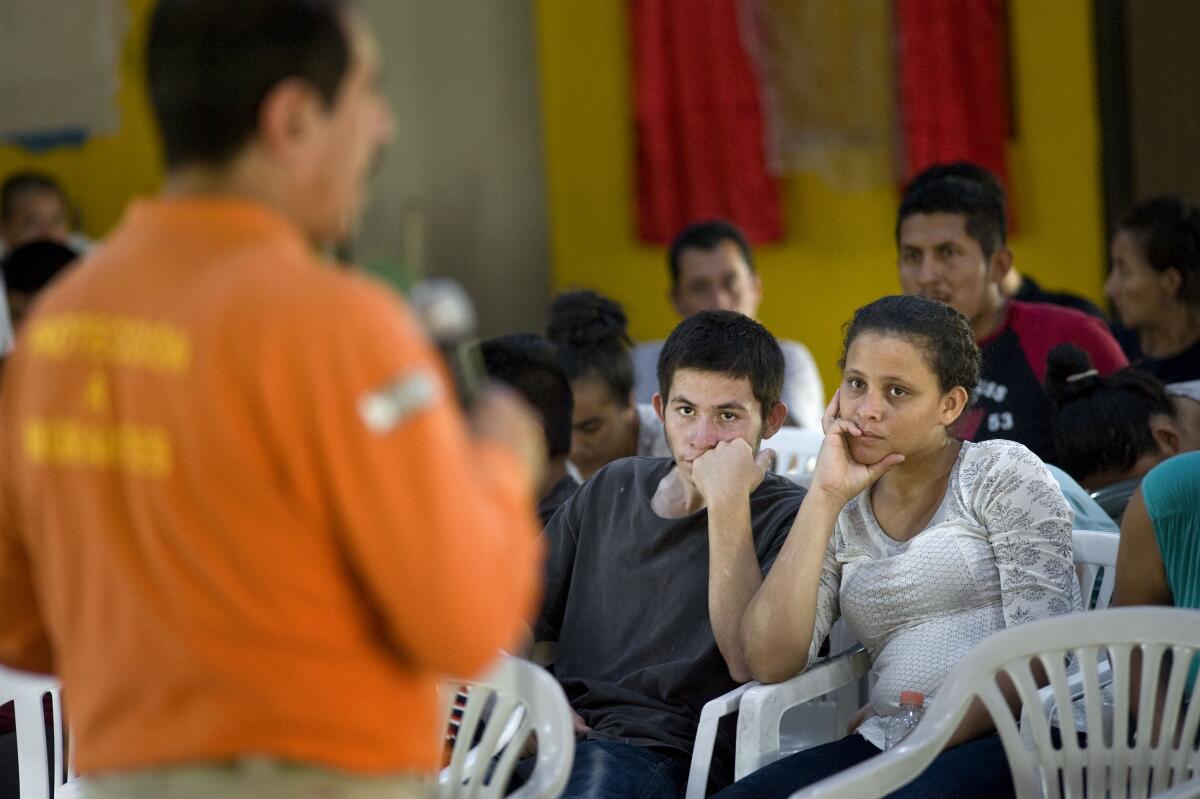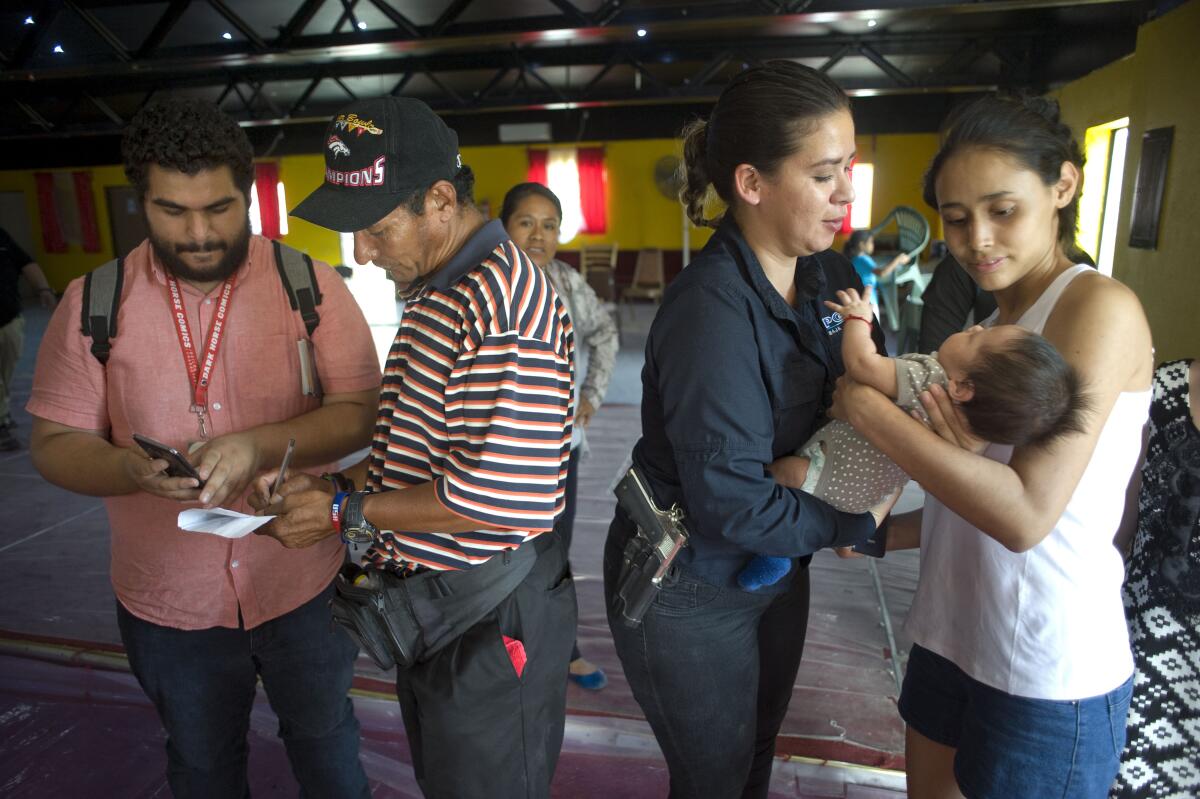Asylum seekers targeted by kidnappers, extortionists and traffickers while waiting in Mexico

- Share via
TIJUANA — Genesis Reyes waited three months in Mexico to see an immigration judge in San Diego.
When her day in court finally arrived, extortionists posing as immigration officials asked her parents for hundreds of dollars claiming the money would release her from a detention center.
As her parents frantically struggled to put the money together, they called Reyes dozens of times. Reyes wasn’t in a detention center. She was sitting on the eighth floor of an office building downtown waiting for an immigration judge to call her name. Her phone was turned off.
“When I turned my phone back on, I had so many messages,” said Reyes, 25, from Honduras. “My mother wanted to know where I was. People called her and said, ‘We have your daughter and you need to deposit the money to bail her out.’”
The scam is just one example of criminals targeting migrants who are waiting in Mexico as they seek asylum in the United States.
Law enforcement, advocates and lawyers working along the border have recorded numerous examples of asylum seekers being victims of kidnapping, human trafficking and extortion.
Some criminals appear to prey specifically on migrants enrolled in the “Remain in Mexico” program either while they are briefly in the U.S. for immigration court, as in Reyes’ case, or as they are being returned across the border to Mexico to await their next U.S. hearing, often months away.
Other con artists seem to cast a wider net, often befriending targets on social media or near shelters.
“These criminals are looking for people who don’t have a place to go and who don’t have money,” said Carlos Roque, an agent with Grupo Beta, a border unit established by the Mexican government specifically to protect migrants.
The scope of the problem is difficult to nail down because victims are often reluctant to come forward, because of their status as migrants or fear of retribution from criminal groups.
Spreading the message
Law enforcement officials in Baja California are so concerned about migrants becoming victims of kidnapping or human trafficking that they’re traveling to different shelters across the state to deliver the warning.
Hector Alejandro Orozco Alvarado, the head of Baja California’s human trafficking unit, said he wants to ease some of the fear migrants may have about coming forward to Mexican law enforcement authorities.
“Our unit investigates the crime of human trafficking and we don’t care where a victim is from or if they are a migrant; we want to protect them. And that’s important for them to understand,” Orozco said.
He said his office handled about eight cases of legitimate human trafficking involving migrants last year. There were three cases of migrants being kidnapped. Orozco acknowledged those crimes are greatly under-reported by victims.
That’s one of the reasons why he said he began reaching out to shelters.

Most of the cases he sees start on Facebook or on similar social media sites.
“In the majority of the cases involving young women, the victims are trafficked for the purposes of sexual exploitation,” he said, adding that his office also investigates cases of migrants being trafficked for labor and for the use of their organs.
For one young Salvadoran, it started with friendly Facebook messages.
“Then, he started talking about my family. About how he could cross me and then I could pay him later once I get a job in the United States,” said the underage migrant, who declined to give her name because she is afraid of the human smuggler who tried to convince her to enter the United States illegally.
The Salvadoran migrant, who was pregnant, said the smuggler kept talking about her unborn baby.
“He kept saying ‘Don’t you want to give your baby a better life. If he is born on the other side, he will be a U.S. citizen,’ and I almost — just for minute I thought ‘He’s right,’ but then I realized I did not want to put my baby in that kind of danger, and I did not go,” she said.
Smugglers may have other intentions for vulnerable migrants than helping them cross the border illegally, which means using their services can become a life-threatening experience, according to migrants and law enforcement.
Part of the presentation aimed at migrants advises how to react if they find themselves held against their will.
During a lecture in the bright yellow sanctuary at Agape Mision Mundial shelter in Tijuana on Thursday, Fernando Rivera, who helps lead the anti-kidnapping unit in Baja California, advised a group of migrants to take note of all their movements, the time of day, special odors, distances they travel and any sounds they hear.
The law enforcement officers showed a slide of a recently rescued group of migrants who had been held handcuffed in sweltering caves near Tecate, stressing the cross-border cooperation between U.S. and Mexican authorities.
An officer with the Baja California prosecutor’s office told the group that, even though detectives never recommend anyone going with a pollero — or human smuggler — to try to cross the border illegally, they are realistic, knowing that some in the room may try it.
In that case, they recommended surreptitiously snapping a photo of the smuggler before leaving, and sending it to a family member, along with any other information they can collect, like their phone number and physical description. The United Nations Office on Drugs and Crime estimates that human smuggling from Latin America into the United States accounts for an estimated $7 billion in revenues for organized crime groups in the region.
Pastor Albert Rivera, who runs the Agape shelter, said several months ago a man pretending to be a migrant infiltrated the Agape shelter and began working as a pollero, convincing some young women to try to cross into the United States with him.
The women ended up briefly kidnapped and terrorized during the ordeal. One woman escaped, but she was so scared she immediately went back home to Honduras, Rivera said.
Rivera said that’s one of the reasons he reached out to local law enforcement and invited them to his shelter.
“It was very good information,” said Jorge Aguilar, a Honduran migrant traveling through Tijuana with his wife and daughter. “We are very worried about something like this happening because we are vulnerable here. It’s only out of desperation that our people look for another way to cross, like using the services of a pollero. But thank God, we haven’t experienced anything like that yet.”
Aguilar said his family plans to wait for their U.S. immigration hearing appointment in September.
Remain in Mexico
Migrants enrolled in the Remain in Mexico program, officially called Migrant Protection Protocols, have reported feeling especially vulnerable.
One common scam is for criminals to pose as cab drivers or good Samaritans offering to transport tired asylum seekers when they are returned to Mexico after spending a long day in U.S. immigration courts. Once migrants get into the vehicle, the drivers take them to an undisclosed location and dial every American number on their abductee’s contact list in an effort to fetch the highest ransom possible.
In one case, a family was offered a ride to a shelter but ended up being kidnapped and held for $1,000 ransom, said Luis Gonzalez, a supervising attorney with Jewish Family Service, a San Diego-based nonprofit representing many people enrolled in Remain in Mexico.
Gonzalez talks to dozens of asylum seekers in the program as the nonprofit screens potential clients. Several migrants, mostly women with young children, reported feeling as if they have targets on their backs when immigration officials drop them off at the Mexican side of the San Ysidro Port of Entry at night.
“The thing that a lot of the people I’ve talked to say — I’d say at least 50% — is that when they are returned to Mexico there are always people around there,” Gonzalez said. “They are trying to see who has been returned. People go up to them and ask, ‘Were you just sent back?’ or ‘Are you waiting for immigration?’”
In Reyes’ situation, the extortion came via phone call.
Her mother, Sonia, recorded part of the call where the con man asked her for cash under the guise of getting her daughter out of a detention center.
During the short conversation, Sonia repeatedly asked the man to put her daughter on the phone. But the man said he couldn’t do anything until she deposited the money. He originally asked for $800 but said he could bail Reyes out for half.
“I was confused, I was nervous and in shock,” said Reyes’ mother who declined to provide her last name for fear of more extortion calls. “I felt anxious because I wanted to speak with my daughter. I told them I would get the money.”
However, just before she left her house to deposit the money, a friend stopped her and told her the whole thing was a hoax and that immigration officials don’t call people and ask for money. Sonia didn’t pay.
Unfortunately, the extortionists also called Reyes’ father. He ended up paying about $500, Reyes said.
As more asylum seekers become crime victims, those in the Remain in Mexico program protect themselves by avoiding the outside world, Gonzalez said. “They won’t leave their place because they’re afraid of what might happen,” Gonzalez said. “They basically just stay inside the shelter or room they are renting.”
In February, lawyers from the American Civil Liberties Union and the Southern Poverty Law Center challenged the policy in federal court, claiming the Trump administration had not sufficiently considered the dangers migrants face in Mexico. A U.S. 9th Circuit Court of Appeals judge granted the federal government’s request for a stay, allowing the program to continue until a final ruling.
Fry and Solis write for the San Diego Union-Tribune.
More to Read
Sign up for Essential California
The most important California stories and recommendations in your inbox every morning.
You may occasionally receive promotional content from the Los Angeles Times.












